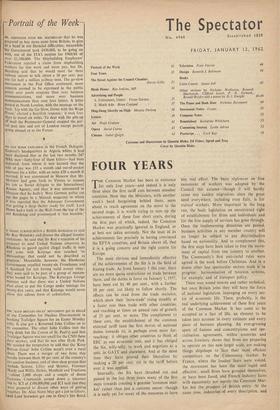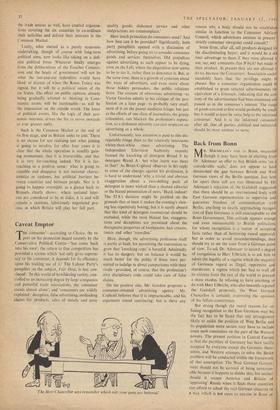FOUR YEARS
rin HE Common Market has been in existence I for only four years—and indeed it is only three since the first tariff cuts between member countries. Now that the Ministers, with another week's hard bargaining behind them, seem about to reach agreement on the move to the second stage, it is worth trying to sum up the achievements of these four short years, during the first part of which, indeed, the Common Market was practically ignored in England, or at best not taken seriously. Not the least of its achievements lies precisely in having convinced the EFTA countries, and Britain above all, that it is a going concern and the right course for Europe.
The most obvious and immediately effective of the achievements of the Six is in the field of freeing trade. As from January 1 this year, there are no more quota restrictions on trade between them; and the duties in force on January 1, 1957, have been cut by 40 per cent., with a further 10 per cent. cut likely to follow shortly. The effects can be read from the trade statistics, which show their 'intra-trade' rising steadily at a faster rate than trade with other countries, and reaching at times an annual rate of growth of 25 per cent. or more. The complement to these cuts, the establishment of the common external tariff (and the first moves of national duties towards it), is perhaps even more far- reaching: it obliges other countries to think of EEC as one economic unit, and it has obliged the Six, willy-nilly, to work and negotiate as a unit, in GATT and elsewhere. And at the same time they have proved their liberalism by making a 20 per cent. cut in the tariff before ever it was applied.
Internally, the Six have thrashed out and passed in the last three years many of the first steps towards creating a genuine 'common mar- ket' rather than just a .customs union—though it is early yet for many of the measures to have any real effect. The basic reglement on free movement of workers was adopted by the Council this autumn—though it will hardly cause any sudden migrations since the great need everywhere, including even Italy, is for trained workers. More important in the long run, the basic legislation on unrestricted right of establishment for firms and individuals and for the free supply of services has gone through. Once the implementing directives are passed, business activities in any member country will no longer be subject to any discrimination based on nationality. And to complement this, the first steps have been taken to free the move- ment of capital from one country to another. The Community's first anti-cartel rules were agreed in the week before Christmas. And in a dozen other less spectacular sectors work is in progress: harmonisation of taxation systems, for example, and of transport policy.
These may sound remote and rather technical; but once Britain joins they will have the force of national legislation, impinging on every sec- tor of economic life. There, probably, is the real underlying achievement of these first years of the Common Market. It has come to be accepted as a fact of life, an element to be taken into account in every estimate and every piece of business planning. An ever-growing spate of fusions and concentrations and spe- cialisation agreements, within countries and across frontiers, shows that firms are preparing to operate on this new larger scale, are making things shipshape to face their most efficient competitors on the Community market. In France, where the loudest fears were voiced, the movement has been the most rapid and effective: small firms have grouped themselves, or have been fused, and French industry faces with equanimity not merely the Common Mar- ket but the, prospect 'of British entry. At the same time, industries, of every description, and the trade unions as well, have created organisa- tions covering the six countries to co-ordinate their activities and defend their interests in the Common Market.
Lastly, what started as a purely economic undertaking; though of course with long-term political aims, now looks like taking on a defi- nite political form. Whatever finally emerges from the deliberations of the Fouchet Commis- sion and the heads of government will not be what the out-and-out federalists would have liked, or dreamt of when the Rome Treaty was signed, but it will be a political union of the six States. The effect on public opinion, already being gradually attuned to thinking in Com- munity terms, will be inestimable--as will be the impression on the outside world. The force of political events, like the logic of their eco- nomic interests, drives the Six to move onwards to ever greater unity.
Such is the Common Market at the end of ' its first stage, and as Britain seeks to join. There is no excuse for not realising just what joining is going to involve, for after four years it is clear that the whole operation is steadily gain- ing momentum, that it is irreversible, and that it is very far-reaching indeed. Yet it is far- reaching in a positive sense: what is going to . crumble and disappear is not national charac- teristics or customs, but artificial barriers be- tween countries and between people. Nor is it going to happen overnight, as a glance back to • Brussels clearly shows: where national inter- ests are considered to be at stake, it is and will 'remain a cautious, laboriously negotiated pro- cess, in which Britain will play her full part.































 Previous page
Previous page